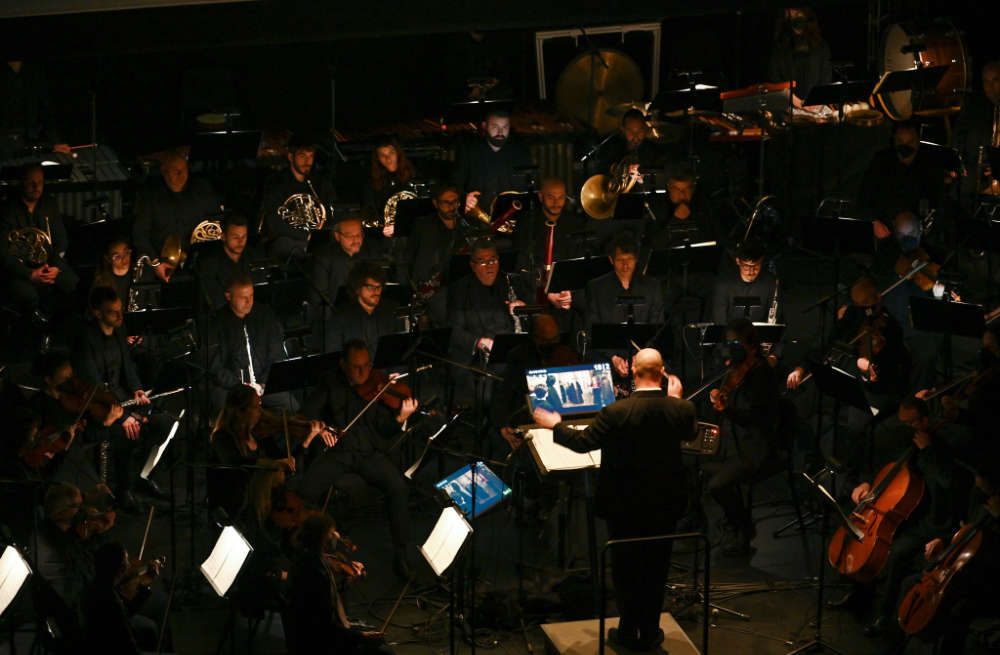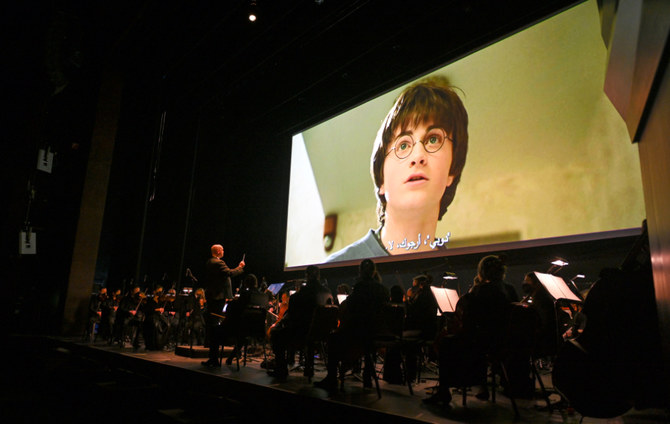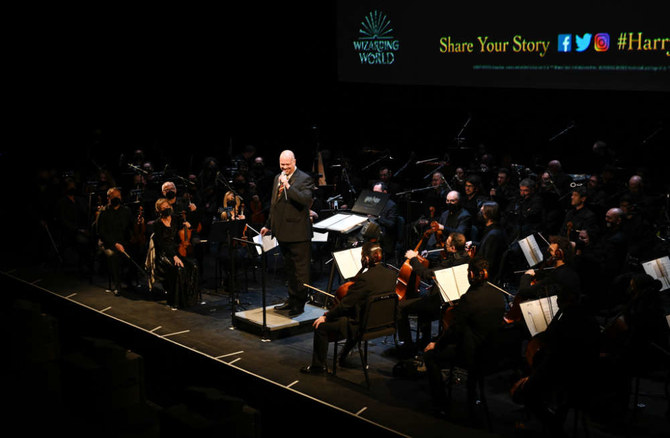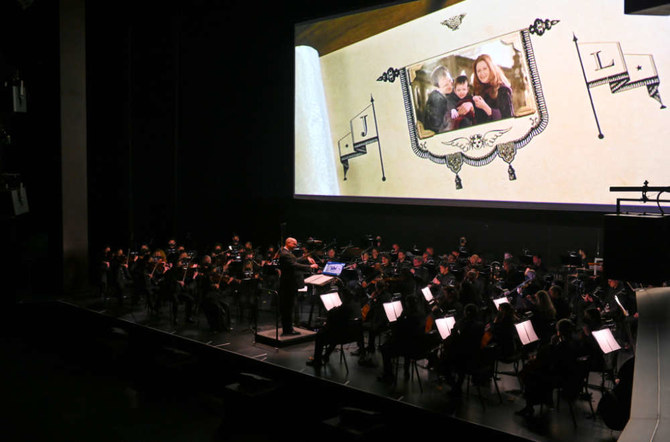DHAHRAN: Magic swirled around a full moon as the Harry Potter and the Chamber of Secrets in Concert came to life. The 20-year-old movie played on the big screen at the Ithra theater, accompanied by Arabic subtitles and the sounds of a live orchestra.
The experience had nostalgic vibes with a twist.
The lights were dimmed after we sat down, the music started, and I got goosebumps at the opening scene when Harry is seen flipping through a photo album with the reflection on his glasses.
The famous twinkling music was almost like another character. It tiptoed around as it carried through his conversation with his owl and stopped dramatically when it wanted us to pause and think.

The Harry Potter and the Chamber of Secrets in concert series played daily on multiple showings between Feb. 15-19, 2022 at the Ithra theater. (AN photos by Ahmed Al-Thani)
The audience applauded whenever a beloved character such as Ron or Hermione came on screen.
It felt like interactive theater, but we all knew when to clap and when to stop. We all knew the ending, but it didn’t make us enjoy the journey any less.
HIGHLIGHT
The orchestra and its 90 members took around 10 days to practice with a full dress rehearsal to fit the show into that very specific venue. A very touching moment was when the conductor Tim Henty gave his entire welcome speech in Arabic.
The live music heightened every dramatic scene and changed the pulse of the film, like a heartbeat. Each frame was carefully studied to sync with the visuals on the screen. In fact, the conductor had a laptop with the movie playing in front of him as he led the way. Those six or seven notes could make you remember that song forever—the difference between mere notes and magic.
The orchestra and its 90 members took around 10 days to practice with a full dress rehearsal to fit the show into that very specific venue. A very touching moment was when the conductor Tim Henty gave his entire welcome speech in Arabic.

(AN photos by Ahmed Al-Thani)
“Tim always learns to introduce the films in the language of the country he is conducting in. It is a way of being closer and respectful to the people to whom you are performing and helps in commutating the warmth musicians feel for their audiences,” Rob McIntosh of MAC Global, the booking agency which organized the event, told Arab News.
“It has been such a joy to perform to audiences at the Ithra, who are clearly well informed about music and, indeed, to visit Saudi Arabia, where we have all felt so welcome,” Henty told Arab News.
“A CineConcerts performance is an opportunity to see just how much of an impact music can make on a film. John Williams’ iconic music is a joy to perform, and it is my hope that this incredible score will leave the audience with great memories of the evening.”
Ithra’s head of performing arts and cinema Majed Z. Samman wrote in the show’s accompanying booklet that this concert was part of an ongoing cross-cultural exchange.
“On this occasion, we are proud to present our audience with one of the world’s most memorable musical film experiences, Harry Potter and the Chamber of Secrets in Concert. It is the second installment of one of the most beloved film series, and is accompanied by Orchestra Italiana del Cinema, performing John Williams’ unforgettable score, live to picture at the Ithra Theater,” he said.
The theater has previously hosted “Harry Potter and the Philosopher’s Stone” in Concert, with the UK’s National Symphony Orchestra, in 2019. This version, composed by Williams and conducted by Henty with the Orchestra Italiana del Cinema, is the second instalment to bring the sequel to life on a high-definition 40-foot screen.
“I would love to thank very much Saudi Arabia, Ithra’s highly professional staff and community, and the audience for sharing such an incredible experience and a great example of cultural exchange between our countries. We hope to be back soon for new exciting programs and activities which can directly involve the audience and the Arabic communities. Culture is the greatest value for the world and the young generation,” orchestra president Marco Patrignani told Arab News.
People complied with the rules around photography and video recording, keeping their phones stowed away in pockets or bags, and everyone appeared transfixed on what was before—and around—us.
I have never attended a show where an audience gave a standing ovation for the closing credits. Not a single person got up to leave, although many stood and clapped enthusiastically. The credits rolled on the screen, and the instruments kept playing. People kept clapping.
Scott Lamont, who works at Saudi Aramco, took his eight-year-old daughter to see the 7:30 p.m. show. Although they knew the books and had watched the movies over the years, the concert was still a treat.
“I’m here with my daughter Melisa to see the show tonight. We have read the books, and we’ve seen the movies, and she collects a lot of the Harry Potter LEGO—she has the Weasley home—and this is very exciting for her,” he told Arab News.
They had come from Melisa’s music lessons and, through small yawns from underneath her mask, it could be seen how much of a thrill it was for her to witness her many loves come together in one space. She was determined to stay awake for it and soak up every moment.
“The first time I saw Harry Potter, I think when I was four when I was in my grandparent’s house in Canada for the summer, and I loved it! I have seen a bit of the books, but I’m hoping to read them when I’m in middle school—I’m in third grade now. This is my third time watching the film. I think the best part is when they use the wands, and they hit it at Malfoy, and he falls on his back! I play violin and piano, and I’ve never seen an orchestra live, so it’s a great experience,” she said.































